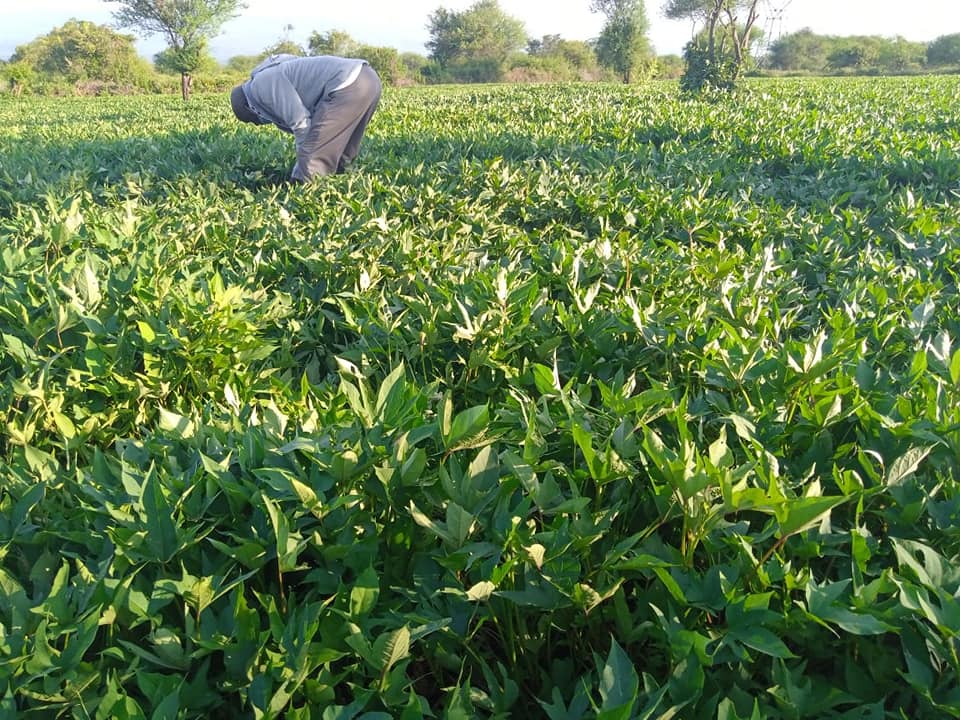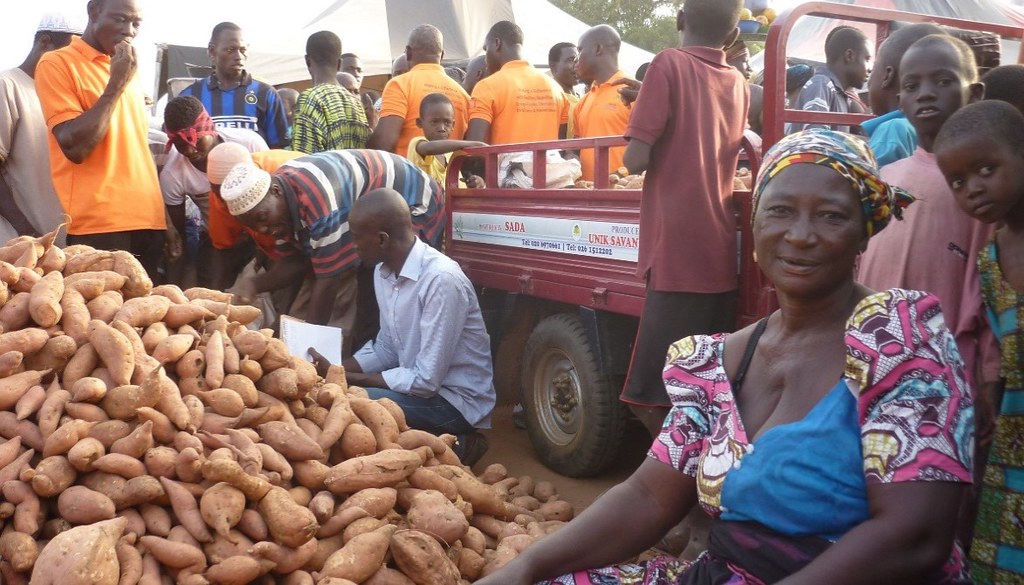
Par Ekouya Suzanne HOUEFONDE
Rwanda is initiating a significant transformation of its sweet potato value chain, aiming to increase local consumption, enhance nutritional outcomes, and create new export opportunities.
In furtherance of this objective, the African Development Bank, through its programmeTechnologies for African Agricultural Transformation (TAAT), in collaboration with the Rwanda Agriculture and Animal Resource Development Board (RAB) and the International Potato Center (CIP), convened a Sweet Potato Stakeholders’ workshop in Kigali, Rwanda, on November 28, 2024.
The event aimed to validate the Sweet Potato Roadmap, a strategic framework designed to improve the country’s sweet potato value chain.
Acknowledging the significant potential of this crop, the workshop assembled essential stakeholders to explore vital interventions, business prospects, and strategies to enhance market and trade connections, thereby ensuring the sustainability and growth of Rwanda’s sweet potato industry in both domestic and global markets.
The workshop had several objectives, primarily aimed at identifying and resolving bottlenecks in the sweet potato value chain.
It involved mapping essential stakeholders and activities across various districts while investigating potential value addition through enhanced agricultural practices and better post-harvest management.
Additionally, the session served as a forum for validating the roadmap document, which details required process enhancements and provides specific business recommendations.
The workshop also sought to align these efforts with Rwanda’s overarching agricultural development strategy as outlined in the PSTA-V framework, promoting sustainable growth and long-term viability for the sweet potato sector in the nation.
The workshop created the nation’s inaugural sweet potato roadmap, a strategic framework intended to direct interventions throughout the value chain.
This roadmap represents a pivotal development for Rwanda’s agricultural landscape, offering a detailed strategy to tackle existing challenges, optimise efforts, and synchronise the actions of stakeholders within the sweet potato sector.
It will be an essential tool for the government, policymakers, and private sector participants, empowering them to collaboratively improve productivity and enhance value addition in the industry.
A transformative initiative for sweet potato cultivation in Rwanda
Sweet potatoes have long been a fundamental crop in Rwanda and throughout Africa, yet their full potential has often been overlooked due to insufficient strategic coordination.
“This marks the first comprehensive roadmap for sweet potato in Rwanda,” stated Jean Claude Nshimiyimana, Associate Scientist at CIP.
“It outlines the necessary activities and interventions to tackle sector challenges and establishes a framework for unified efforts” The roadmap aims to transition sweet potatoes from a subsistence crop to a commercially viable and nutritionally important product.
Nshimiyimana emphasized that it will focus on key interventions such as seed multiplication, the distribution of improved varieties, and enhancing value chain processing.
CIP, a member of the CGIAR research centers, is dedicated to research and development for potatoes and sweet potatoes in Rwanda.
The organisation has played a crucial role in introducing new sweet potato varieties. It has partnered with the RAB to improve the crop’s production and market potential.
Advancing research and fostering innovations
The RAB Sweet Potato Programme is leading initiatives to improve sweet potato varieties in Rwanda.
Under the guidance of plant breeder Dr Jean Ndirigwe, the programme aims to create high-yield, nutrient-dense strains, including orange-fleshed sweet potatoes (OFSP) and purple-fleshed varieties rich in anthocyanins.
“Our focus is on districts with significant malnutrition challenges, where we are introducing vitamin A-rich varieties to lessen dependence on expensive supplements,” Ndirigwe stated.
He noted that the program balances innovation and tradition, ensuring that traditional white-fleshed varieties are still available to satisfy various consumer tastes.

Additionally, the program collaborates with research stations throughout Rwanda, including those in Rubona, Mututu, and Nyagatare, to evaluate and adapt varieties for different agro-ecological conditions.
“Our programme collaborates with various research stations and is aligned with the TAAT initiatives to enhance production capabilities.
In addition to improving nutrition, we emphasize market integration by working with processors to create value-added products such as bread, cakes, biscuits, and porridge made from sweet potato puree.
This strategy increases household income and improves access to nutritious food options,”Ndirigwe said.
Value addition and market potential A vital aspect of the program’s strategy is its focus on value addition.
By converting sweet potatoes into processed goods such as puree, bread, mandazi, cakes, and instant porridge flour, the sector can create new economic opportunities.
“Transforming sweet potatoes into value-added products opens up niche markets and generates employment,” Ndirigwe remarked.
He emphasized collaborations with local processors like Sina Gerard and Ikijumba, who are developing innovative products for both local and international markets.
New OFSP roadmap: a boost farmers and exporters
Allen Umulisa, Managing Director of RAI Green Stalils Ltd, conveyed her optimism regarding the future of sweet potato cultivation in Rwanda.
“We are thrilled to witness advancements in the value chain,” she stated.
“With the introduction of new varieties and a rise in market demand, we are confident in our ability to meet both local and export requirements.
” Umulisa also highlighted the necessity of educating farmers on the advantages of sweet potato farming.
“It is essential to involve more farmers in cultivating these varieties to meet the increasing demand,” she remarked.
Tackling malnutrition and enhancing livelihoods Sweet potatoes are crucial in addressing child malnutrition, especially in at-risk areas such as Rubavu.
“Our district faces significant challenges with high rates of child stunting,” noted Augustin Rwandanga, the Agronomist for Rubavu District.
“Advocating for orange-fleshed varieties can enhance nutrition, create income opportunities, and combat malnutrition.
” Rwandanga further mentioned that the district collaborates with professional vine multipliers to provide farmers with high-quality planting materials.
“Farmers typically depend on traditional vines, which restricts their productivity. This initiative aims to fill those gaps,” he explained.
Addressing obstacles and progressing forward
The sweet potato sector, while promising, encounters several challenges such as limited access to high-quality seeds and insufficient awareness among farmers.
Nevertheless, stakeholders are hopeful that the forthcoming roadmap will tackle these concerns effectively.
“We now possess a definitive strategy to direct our efforts and ensure that all participants are on the same page,” stated Nshimiyimana.
“This document is set to revolutionize Rwanda’s sweet potato industry.”
As Rwanda gears up to execute the roadmap, the emphasis will be increasing production, improving value addition, and fortifying market connections.
This approach establishes sweet potatoes as a fundamental element of the nation’s agricultural and nutritional policies, enhancing food security and household incomes while exploring global market prospects.
With the roadmap established, stakeholders are confident that Rwanda’s sweet potato sector is on the brink of significant change.
“Our goal is to reach a greater number of households with nutrient-dense varieties and to support rural communities where sweet potatoes are a dietary staple,” Ndirigwe remarked.
The roadmap is anticipated to be completed and shared with all stakeholders by early 2025, heralding a new era for sweet potatoes within Rwanda’s agricultural framework.
Laban Ahija, the TAAT OFSP Value Chain Technology Transfer Officer expressed enthusiasm regarding the advancements in validating the seed roadmap.
TAAT is actively assisting several countries in implementing the Orange Fleshed Sweet Potato Project (OFSP), and he highlighted the fruitful collaboration with various partners, particularly in Rwanda.
“In Rwanda, for example, we are collaborating with RAB, while other nations are developing different strategies for the OSFP implementation.
I can confidently say that it is a low-input product with numerous advantages, one of which is its high beta-carotene content, a vital precursor to vitamin A.
Vitamin A plays a crucial role in enhancing immunity, especially for breastfeeding mothers and children under five, as it supports both immunity and cognitive development,” Ahija said.
He underscored the necessity of increasing awareness about the low input and ease of cultivation of the orange sweet potato, which serves as an affordable staple food, particularly advantageous for resource-limited farmers. TAAT’s goal is to encourage the adoption and expansion of this sweet potato’s production, as farmers have been focusing primarily on staple crops such as maize and sorghum.











